White chrysanthemums: description, application and varieties
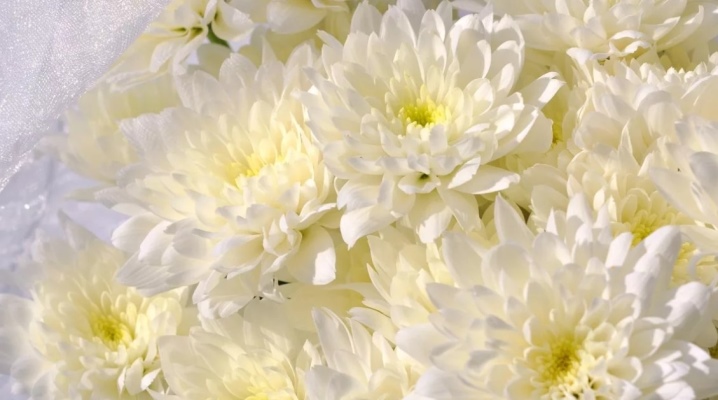
Chrysanthemum is an exquisite luxurious flower that is very popular. No wonder he became a "character" even in a number of songs. But we need to figure out what kind of plant it is, and how to properly handle it.
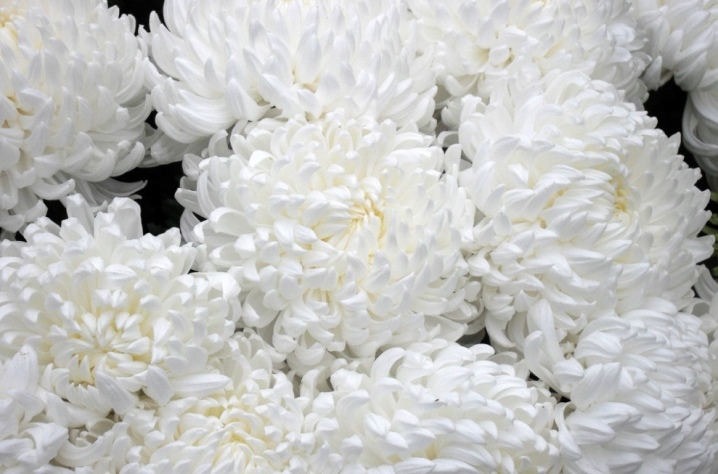
Peculiarities
The description of white chrysanthemums should start with the fact that this is a whole group of hybrids and varieties. The garden chrysanthemum has become a very popular horticultural crop, mainly blooming in the fall months. This is a plant of short daylight hours, belonging to the Asteraceae or Asteraceae family. It is believed that closely related plant species are tansy and yarrow. Chrysanthemums come from temperate and cold climates.
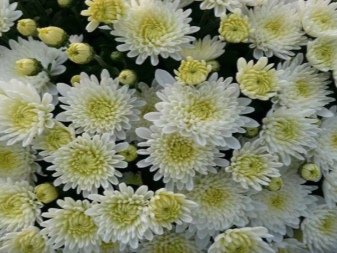
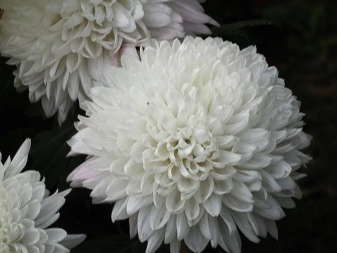
Usually these are branching dwarf shrubs. Herbaceous varieties are found several times less often. In ancient China, they began to use such a culture in garden design as early as the 6th century BC. Indoor culture includes varieties with small flowers and not too high pillars. Over the past 100-200 years, the number of varieties has increased significantly.
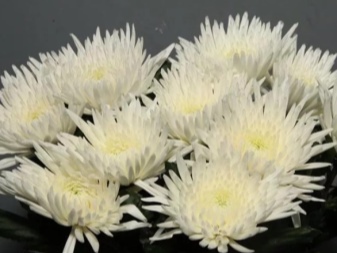
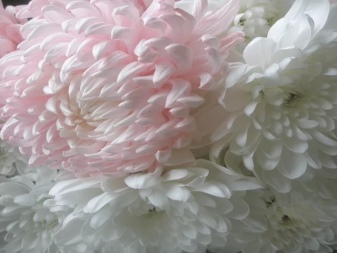
Types and varieties
The first place is deservedly taken by inodorum "Attire of the Bride"... This plant has double flowers and forms feathery leaves. In whatever flower garden this culture is grown, it introduces an original note and creates a positive attitude. The height of adult copies of the "Bridesmaid Dress" can reach 0.45 m. A good option for growing this crop is planting in turf or humus soil. It is mixed in advance with the addition of sand and rotted manure. Water this chrysanthemum once a day, sometimes every other day.
The leaves are sprayed every morning and evening. Then the wilting of flowers before the onset of autumn will be excluded. Pinching the top of the bush helps to speed up the branching process.
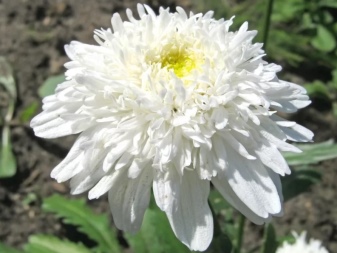
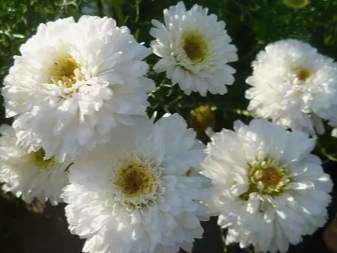
The variety also deserves attention. "Snow White"... This plant was bred in domestic conditions, more precisely, in the Nikitsky Botanical Garden. This chrysanthemum produces large semi-double flowers. The plant develops over many years. It looks like a very large chamomile. The petals of a snow-white color resemble tongues and are arranged in 5 tiers surrounding the yellow center. The bud can grow up to 0.19 m. At the same time, the highest plant height sometimes reaches 0.8 m. The stems develop straight and are firm, branching well enough. The saturation of their leaves is moderate. The leaf itself is smooth and succulent, belongs to the pinnate type. Emerald green foliage predominates, the length of which can be 0.15 m. Snow White is actively used both in cut form and in mixborders of the same color. It is noted that in a vase, a chrysanthemum is able to stay fresh for up to 20 days, and sometimes more.
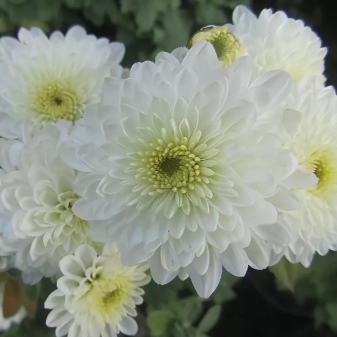
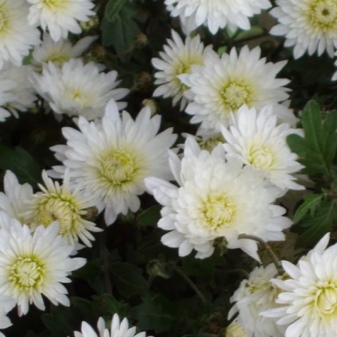
A good alternative is also Stallion... It is a yellow-white chrysanthemum that produces relatively small flowers and develops over several years. Along with the atypical external shape, this culture stands out with minimal whimsical cultivation. The latter circumstance is especially valuable for novice gardeners. The cross-section of the flower is from 0.03 to 0.04 m. There are both monotonous and colored inflorescences in two different tones. "Stallion" blooms from the end of September until the arrival of frost, and it is recommended to use it for making bouquets.
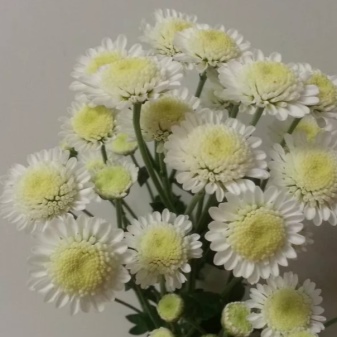
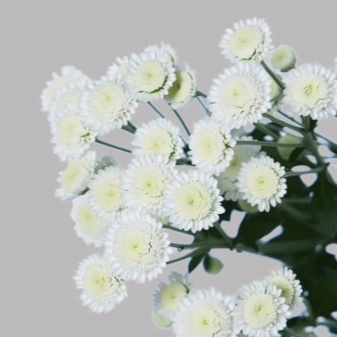
Chrysanthemum "White stars" looks very cute and original, covered with a mass of branching shoots.When flowering occurs, the bright green bushes are abundantly covered with small flowers. They light up like small stars. The culture is great for:
pot growing;
planting in garden vases;
formation of discounts;
creating curbs;
framing flower beds around the perimeter.
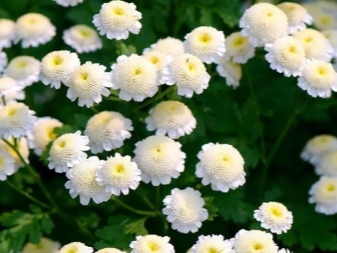
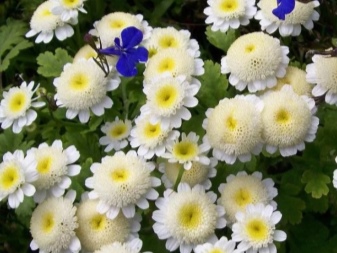
The plant perfectly tolerates bad weather conditions. Until the arrival of early frosts, the external attractiveness and density of color will be preserved. It is recommended to plant on loose, water-permeable soil saturated with various fertilizers. The soil should be neutral in acidity. Waterlogging of the landing site is not allowed. Sowing seeds for seedlings can be done in March. Deepening of the planting material is impractical. Seedlings can be expected on average 10-14 days after planting. Planting in partial shade is allowed, however, optimal flowering is achieved when placed in the open sun.
With the onset of a snowy winter, it is enough to cover with spruce branches or a layer of sawdust.
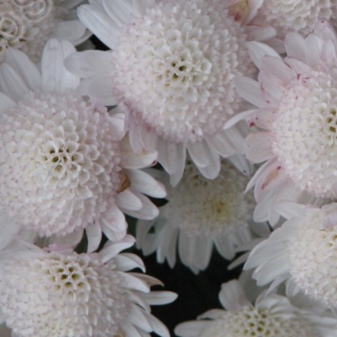
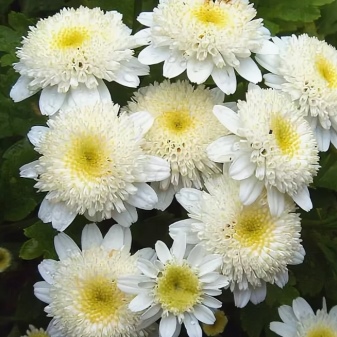
Chrysanthemum also deserves attention. "Polar bear"... This variety is thermophilic and develops well in elevated areas. Initially, the center has a lemon color, then the middle part of the bud will turn white. The plant is highly resistant to adverse influences.
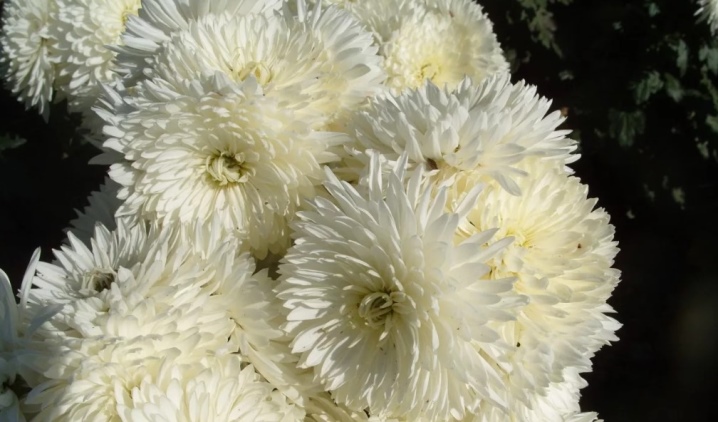
Variety "Magnum" distinguished by large flowers with a magnificent appearance; flowering lasts long enough. The culture was developed by Dutch specialists. They tried to make it suitable for the formation of large bouquets and floristic groups. The inflorescences are lush and silky. In addition, when packed in a special net, Magnum can retain its appearance when moved hundreds and thousands of kilometers. In a room vase, the plant will stand from 30 to 40 days without the slightest problem.
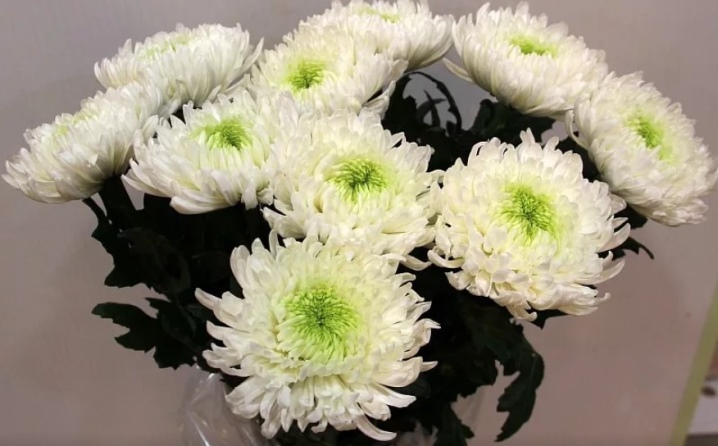
The next noteworthy variety is "Joy"... The flowers have a white or delicate cream color with a green center (sometimes with a yellow-green center). Outwardly, the culture resembles a large bouquet chamomile. Flowering continues throughout the fall, and it looks like summer is not over yet. "Joy" was brought out in the Republic of Korea. It is generally accepted that the variety belongs to the semi-double group. Dense stems of small-flowered culture have 10 inflorescences. The bud is up to 0.08 m in diameter. The pleasant color of the flowers is favorably set off by the dense emerald-green color of the large carved foliage.
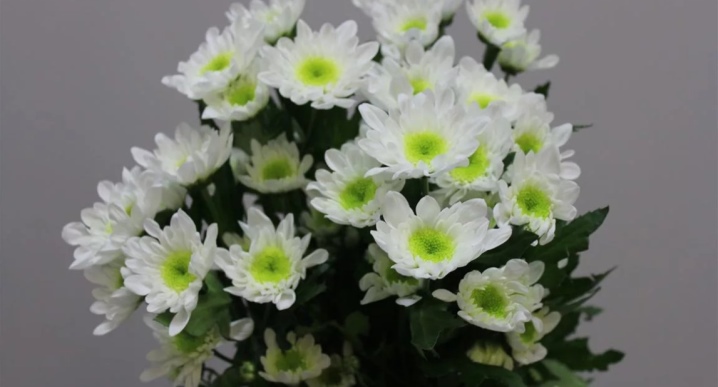
The undersized variety is also popular. "Alexandrite"... It produces semi-double flowers 0.05 m in size. Flowering begins in August. And here is the annual garden culture "Masquerade" can give both simple and double-type flowers. They have a consistently brown bottom color. Have "Nordstern" a white inflorescence of a simple type is found, the central zone of which is painted in carmine color. Additionally, there is always a dark rim.
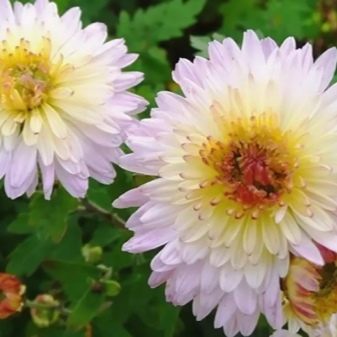
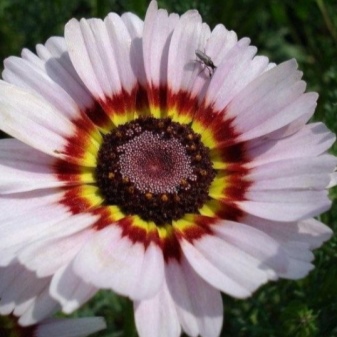
But the small maiden chrysanthemum has a completely different general name in botany - "Pyrethrum snow ball"... This variety blooms effectively and almost independently of irrigation. Unless, against the backdrop of a severe drought, you will have to water the plant more actively than usual. In temperate regions of the Russian Federation, "Feverfew snowball" can be grown on a one-year basis. Small flowers in girth range from 0.015 to 0.03 m. They can belong to the double or semi-double category. Development conditions strongly affect the height of the culture, which can be 0.2-0.8 m. A specific smell appears in the natural habitat. However, after cutting, it will quickly evaporate.
An attractive feature for Russian growers will be that this is a super-early variety, which is in the growing season for as long as possible.
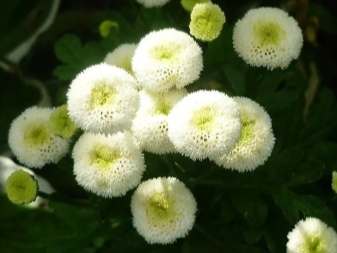
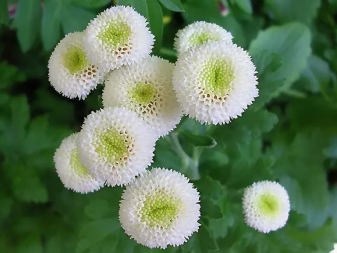
It is appropriate to complete the review of mass varieties at "White Stars"... The culture is fast growing. Bushes branch intensively. Plant height can reach 0.25 m.With skillful handling, the inflorescences of the tops will become a true decoration of any area.
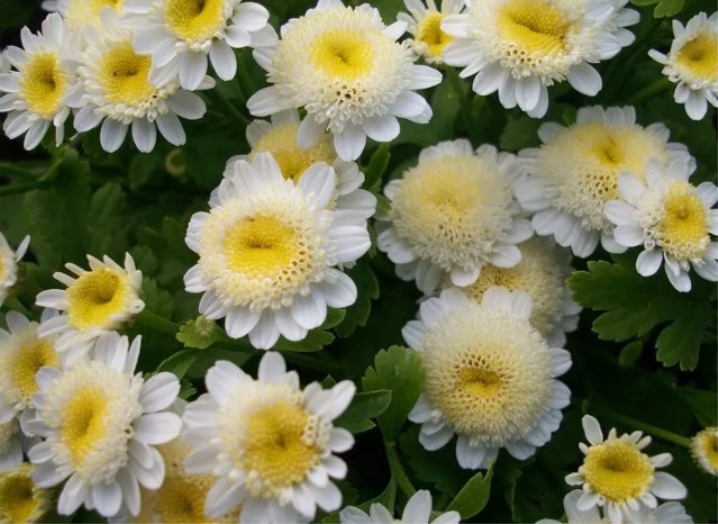
Bush
This group includes, for example, chrysanthemum "Umka"... It is a small-flowered plant of Korean origin. The bush develops multi-headed lush "pompons", the highest plant height is 0.7 m. At the same time, the flower diameter can reach 0.07 m. After flowering, the pom-poms change their color, but do not lose their natural appeal. It is appropriate to use this culture in a rabat or traditional flower bed. The peak of flowering in normal weather falls in September.
Umka can survive a rather harsh winter without a special shelter. Sometimes it is grown not only for horticultural crops, but also for cutting.
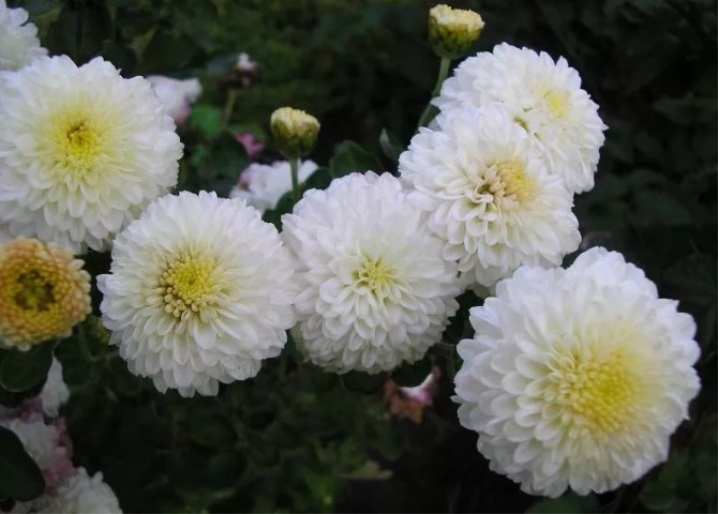
Alternatively, you can consider chrysanthemum "Pina colada"... This plant is used mainly in the bouquet culture. But it will work great with other plants as well. A good companion is green chrysanthemum "Avocado"... The flowers are semi-double, there are a lot of leaves. Inflorescences are relatively small (up to 0.05 m).
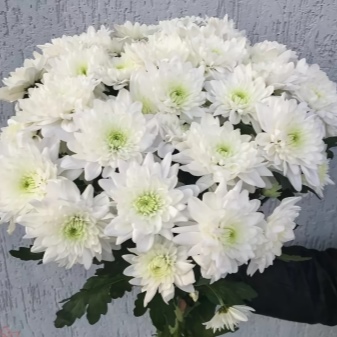
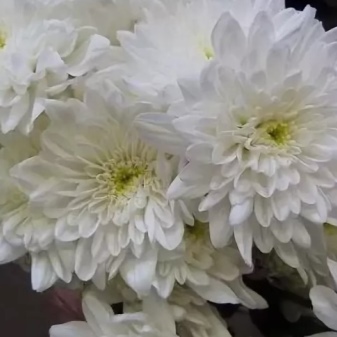
Single-headed
As for single-headed chrysanthemums, this flower can challenge even a rose and other brilliant flowers. Inflorescences have a double or semi-double appearance. The diameter of the inflorescence ranges from 0.12 to 0.25 m. A characteristic feature is the powerful development of an elastic stem, the length of which can even reach 1 m. The specific variety affects what the single-headed chrysanthemum has:
the density of the bush;
its color;
volume.
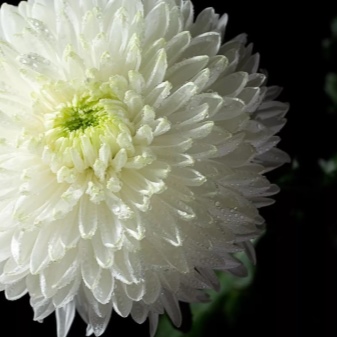
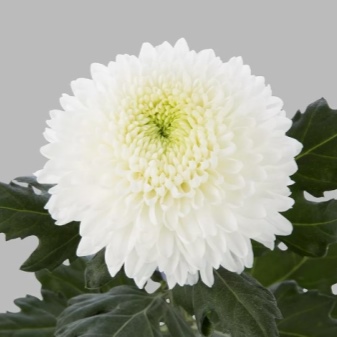
The plant can be grown both in open ground and in a pot. It is guaranteed to maintain an attractive appearance in the cut up to 20 in a row. To do this, break the trunk, not make an incision. A good example of a single-headed cultivar is "Anabel", having inflorescences with a diameter of 0.15 m. The stem reaches a height of 0.7 m.
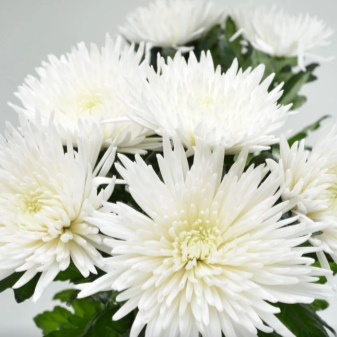
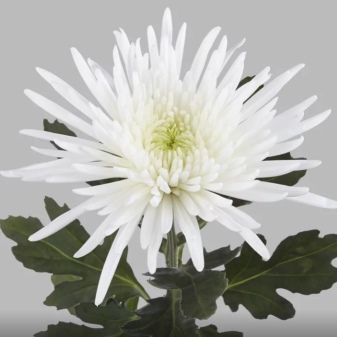
Terry
This variety of white chrysanthemums can grow bushes up to 0.8 m in height. The section of flowers is 0.1 m. The flowering period covers July, August, September and partly October. The culture is light-loving and resistant to mild cold weather, rather resistant to drought. Landing in light, relatively fertile soil is recommended. Sowing should be done in April in seedling boxes. Sprinkle the seeds with soil, but not too large a portion. When the ground is warmed up to 18-25 degrees, shoots can be expected from 10 to 18 days. The landing gap is 0.35-0.4 m.
A change to a place in the open ground is carried out in mid-May.
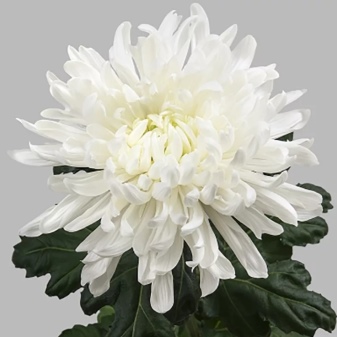
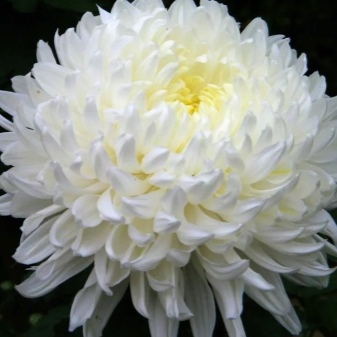
Needle
Sometimes this type of chrysanthemum is also called radial; even in comparison with the recognized leaders of beauty in the plant world, it stands out. A characteristic feature of the culture are elongated petals twisted into tubes. It is these tubes that cause the association with needles. It is important to remember that the petals inside and outside can be colored differently. An example of needle-like varieties are:
"Linda";
"Smile";
"Smile of Autumn";
"Squirrel";
"Stella".
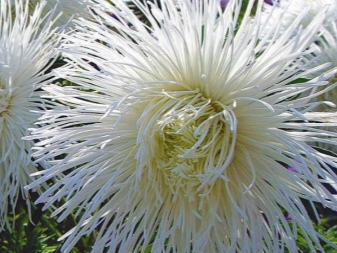
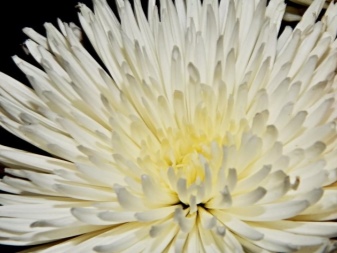
Use in floristry and landscape design
White chrysanthemum with an average rate of development is perfectly combined with cosmea, lily and balsam. But on an ordinary lawn, white flowers alone are enough - they will fully reveal their advantages. It is quite possible to combine the plant with roses. The main thing is that the conditions for the development of varieties approximately correspond to each other. If the formation of a contrasting composition is chosen, you need to plant next to a white chrysanthemum:
pinkish;
yellow;
purple;
bright red plants.
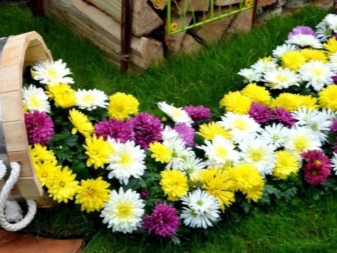
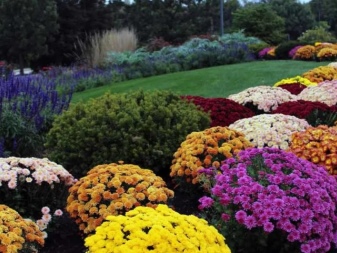
To form durable plantings, you need to use snapdragon or calendula with chrysanthemum. By themselves, undersized varieties used in curbs are planted at a distance of 0.35 m from another crop. For bush types, this figure is 0.4 m. Bushes with a large height and width should be planted at a distance of 0.5 m from all adjacent plantings.If you want to make the garden more pleasant and original, you need to use varieties with variegated and carved leaf plates. Other attractive combinations might include:
low-growing asters;
balsams;
coleus;
zinnias;
marigold.
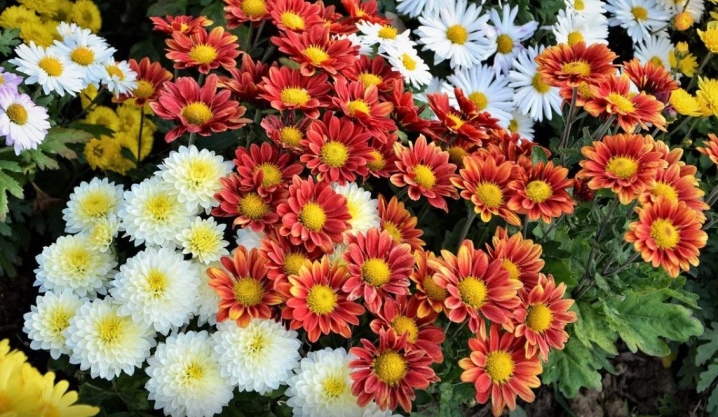
You can find out more about chrysanthemums and their varieties from the video below.





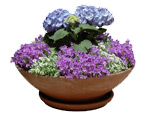
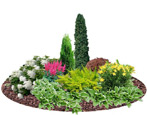
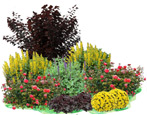



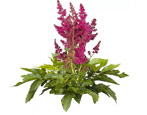
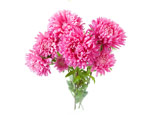
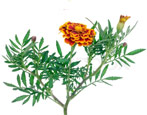
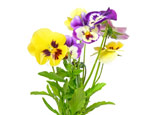

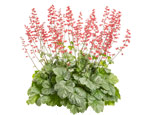

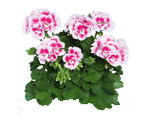
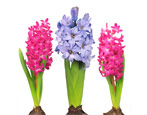
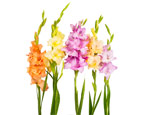
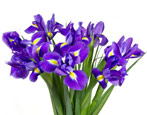
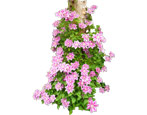
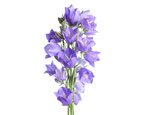
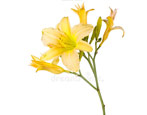
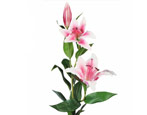
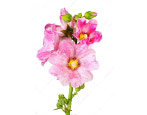
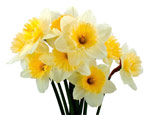
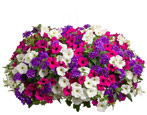
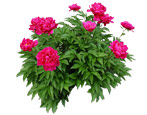
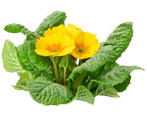
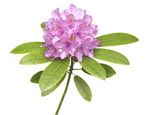

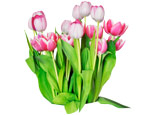
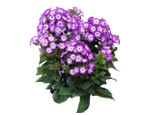
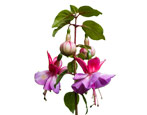
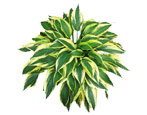
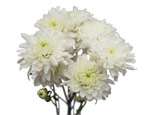
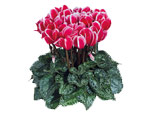
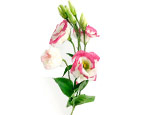































































The comment was sent successfully.